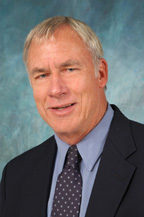 |
Ernest Prentice, Ph.D. |
Dr. Prentice was selected to head the U.S. Secretary of Health and Human Service’s Advisory Committee on Human Research Protection in 2003 by then Secretary Tommy Thompson.
Leading the 10-member committee — which was focused on medical ethical issues –proved to be a rewarding and exciting experience, Dr. Prentice said.
“It was absolutely an honor to chair this committee of experts on the subject of human subject research,” said Dr. Prentice, associate vice chancellor for academic affairs at UNMC. “We’re proud of what we’ve done.”
Under Dr. Prentice’s leadership, the committee carried out the most comprehensive review of federal policy on human research protection since 1981, when most of the federal regulations regarding human research were developed.
The health care picture in the United States has changed drastically since 1981, leaving many of the regulations for human research outdated, Dr. Prentice said.
This was particularly true of regulations dealing with the use of prisoners for medical research.
The goal of Dr. Prentice and the committee was to ensure prisoners could participate in research that could help them with their health problems while also ensuring that they were not exploited by irresponsible research.
“We needed to ensure that we adhered to the principle of justice,” Dr. Prentice said. “Prisoners should not be unfairly deprived of medical research that could benefit them.”
For his service on the committee, Dr. Prentice received the Office of Human Research Protection Medal for Outstanding Achievement in Human Subject Protection. The medal had only been given once before to the surviving members of the National Commission for the Protection of Human Subjects in Biomedical and Behavioral Research, which was established by Congress in 1974.
“That was quite an honor,” Dr. Prentice said. “I was very pleased to be in such distinguished company. It’s a positive reflection on UNMC, as was my involvement in SACHRP.”
The committee made several recommendations about changing national policy on human research, all of which were accepted by current HHS Secretary Mike Leavitt.
Dr. Prentice said being able to serve in the post wouldn’t have been possible without the support of Chancellor Harold M. Maurer, M.D., Rubens Pamies, M.D., vice chancellor for academic affairs, and Tom Rosenquist, Ph.D., vice chancellor for research.
“You can’t do what I did without having the support of senior administrators. They understood the importance of what we were doing,” Dr. Prentice said.
Dr. Prentice’s role on the board was a testament to his expertise in this field and UNMC is fortunate to have him on the faculty, Dr. Pamies said.
“Dr. Prentice is a valuable resource in ensuring human research in this country is effective and ethical,” Dr. Pamies said. “He was a very qualified leader for the committee.”
SACHRP could not find a more appropriate person to head a committee on human research, Dr. Rosenquist said.
“There simply is no one who is more knowledgeable than Dr. Prentice regarding proper regulation of research and protection of human subjects,” Dr. Rosenquist said, “and Dr. Prentice has a unique gift for teaching, for making the rules understandable and acceptable to the scientists.”
Dr. Prentice’s leadership role on the federal committee is concrete proof that UNMC faculty and staff are some of the nation’s premier experts in their fields, Dr. Maurer said.
“We have some of the nation’s finest scientists here at UNMC, and Dr. Prentice certainly fits that description,” Dr. Maurer said. “It was great to see him help shape federal policy on such an important issue.”